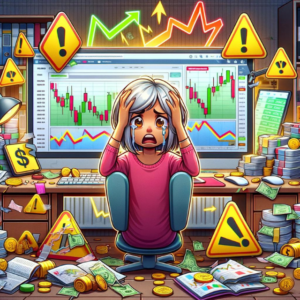Forex Scams
Forex scams can take many different forms, from unauthorised trading to outright theft. You can protect yourself from these scams and keep your money safe by knowing what to look for. The Forex market is highly popular among foreign exchange traders, but it can also be a haven for scammers. The fact that the currency rates are constantly changing right before your eyes means that scams are sadly very easy to commit within this market. With millions being traded every day, it should be no surprise that some people find a way to benefit from this massive sum of money. What should surprise you is the number of Forex scams that occur every single day, although there are safeguards in place for investors who know what to watch out for.
This article will help you protect yourself by pointing out the most common Forex scams, how to avoid them, and who is responsible for investigating these cases if they occur.
What Is A Forex Scam
A Forex scam is any trading scheme used to defraud investors. There are many different Forex scams, but they all share a few common characteristics. Forex scams are designed to lure investors in with the promise of high profits and then steal their money. These scams may involve unauthorised trading, Ponzi schemes, or outright theft.
Types Of Forex Scams
There are many different Forex scams, but they all share one goal: to steal your money. Here are some of the most common scams:
1. Unauthorised Trading
Unauthorised trading is exactly what it sounds like. This is when someone takes control of your trading account without your permission and starts making trades, often with disastrous results. Forex scammers try to gain access to your Forex account by asking for your login details, usually under the guise of a problem with the withdrawal process. For example, Forex scammers might email you and tell you that they can’t send your withdrawal because of a problem with their bank. They ask you to open a new Forex account with them under your email address so that they can transfer the money there and withdraw it successfully.
Once the scammer has your login information, they are able to quickly and easily take over your account and make unauthorized trades and withdrawals.
2. Phishing
Phishing involves you receiving an email or text message that looks like it’s from a legitimate company – such as your bank or broker – but is actually from a scammer. The message will ask you to click on a link or provide sensitive personal information, which is then used to steal your money. For example, if you received an email saying that your Forex broker was contacting you about a special offer, but the link takes you to a Forex broker login page where you can’t sign in with your password, then it is probably phishing.
Many times, these emails look legitimate, with proper spelling, grammar, and even come from an email address that may look correct on initial inspection. However, you might find that the email address it came from is strange, or the link in the email isn’t to your broker.
3. Forex “Robots”
Forex trading robots are frequently either a scam or are over-hyped and under-performing. While this isn’t always the case, it’s always a good idea to be wary of trading bots. Forex robot scams take many different forms, but the basic premise is always the same; it claims to make continuous winning trades (ignoring market conditions) without your intervention. The Forex robot will either run on autopilot or signal the trades for you. In either case, this type of scam is an unnecessary drain on your Forex trading capital. Forex robots cannot advertise themselves as Forex trading software because they fail to meet any of the official Forex trading software criteria. Forex trading robots are merely Forex signal providers under a different name.
4. Rigged Brokers
This is when a broker defrauds you by changing the price at which your trades are executed, thus affecting how much profit or loss you make. Rigged Forex brokers are difficult to spot, as there is no one clear method. However, there are a number of signs you can look out for to help you identify if your broker is dishonest:
– They give very little information about the company they work with, their credentials, or how long they have been trading.
– You don’t receive monthly statements or emails from them.
– They have problems with withdrawing your money. This is a big red flag if you only hear from them when they’re “struggling” with withdrawals.
– When you call, the phone number doesn’t work or is unreachable. When you email, you receive undeliverable messages or other indications that the email address is not valid.
5. Ponzi Schemes
This is when a scammer promises you high returns on investments with little to no risk but pays those “returns” using new investors’ money instead of actual profit. Once enough new investors stop joining in, the scheme collapses, and you lose all of your money.
Ponzi schemes are often associated with Forex trading because scammers lure new investors by promising them large returns on small investments. There is no risk, and the broker only asks for a small deposit with the promise of significant returns. For example, an ad promoting Forex trading might say, “Earn £120 Every Hour with Forex Trading” and then encourage readers to deposit just £200.
Ponzi schemes fail as soon as new investors can no longer be attracted. So if you see anyone offering Forex investment with a guarantee of high returns for little risk, it’s probably a scam! Forex always carries a degree of risk, and there is no way to guarantee Forex earnings.
6. Pyramid Schemes
As the name implies, a pyramid scheme works by recruiting many people who pay a fee each time they convince someone else to join. Many pyramid schemes also require recruits to purchase expensive goods sold by those above them in the pyramid. For example, forex trading scams often disguise themselves as legitimate investment opportunities. They will use Forex-related verbiage and information to confuse you and try to fool you into thinking that they will be able to give you all the steps and information to make you a pro in no time.
If you are approached by someone offering to teach Forex courses for a fee, always check with your school or an independent Forex course provider to see if the materials they are offering come from a reputable source. Forex scams will often use high-pressure sales tactics or claim that their Forex course is the best and only one you will ever need.
Similar Forex scams may target Forex traders looking for additional education in the Forex market. Forex trading is a challenging realm that can seem overwhelming to beginners, but sites like Forex Fraud show you what Forex trading scams look like and how to avoid them. Forex trading courses from a reputable Forex company offer realistic education that includes education on how to reduce your risk of falling prey to scams. Forex scams usually take place online or through email but may also come in the form of a telemarketer offering Forex tips over the phone.
7. SCAM Brokers
This is when a Forex broker’s primary purpose is to steal your money, and they don’t care if you get a return on your investment. SCAM brokers may not give you the tools you need to trade successfully, offer low payouts or steal your profits by claiming “server problems” or other excuses. So how do Forex brokers become SCAM Forex brokers?
Forex brokers can turn into Forex scammers when they get behind on bills and can’t afford to pay their Forex traders. They may also get in trouble with the law, causing them to stop trading or file bankruptcy. Sometimes Forex brokers will agree with a scam broker and swipe all client funds before disappearing. In some cases, SCAM brokers start that way and continue because they simply don’t mind taking other people’s money.
8. Social Trading
Social Trading is when you follow the trades of professional traders, but their trading strategies are used to steal your money. These traders tend to have accounts with many different brokers, so it is hard for the authorities to track them down.
Now and then, you will see advertisements claiming that Forex Social Trading can be used to earn money, with no risk involved. How this works is you join their website or trading group, fund an account and watch as other people trade for you. Usually, these traders will claim to place very close trades to the market price, so it is almost impossible for them to lose.
These “social trading” sites don’t make any trades on your behalf. Instead, they trade for themselves, using the money given to them by those who signed up. In general, these scammers will follow the exact trading strategy that they claimed to use on your behalf. They make a small profit from the spread, but more importantly, they charge you high hidden commissions. In most cases, these schemes tend to lose money in the long run, despite charging such high fees, causing them to shut down in short time periods.
How To Avoid These Forex Scams
Forex scams can take many different forms, from unauthorised trading to outright theft. However, you can protect yourself from these scams and keep your money safe by knowing what to look for. Here are three tips for avoiding Forex scams:
1.Licence and Regulations
There is no central governing authority that regulates and oversees the Forex market to ensure fair trading conditions across the market. However, many Forex brokers are regulated and authorised by the government or a self-regulatory organisation such as the Financial Industry Regulatory Authority (FINRA). Therefore, ensure that your Forex broker is properly licensed and registered before you sign up.
2. If It Seems To Good To Be True It Probably Is
Have you ever seen Forex trading course ads on Facebook and wondered how it could be so easy to make money? Forex scams are everywhere, but the most challenging part is finding out which Forex signals or Forex courses are authentic. Look out for Forex scams, including unauthorised Forex trading, rogue investment advisers masquerading as Forex brokers, and Forex trading robot scams.
Generally, the biggest sign that the course, bot, or broker you’re considering may not be legitimate is if they are making promises and guarantees that are simply too good to be true. If it is advertising risk-free trading or guaranteeing high returns, it’s best to look elsewhere.
3. Research and Possibly Avoid Forex Management Funds
Forex management funds claim to offer investors a way to earn high returns in Forex trading without the risk of losing money through Forex scams. While there are definitely legitimate Forex management funds, it’s crucial to research any company you plan to work with. Far too often, Forex management fund managers may not have enough experience to manage your money correctly. And, in the most extreme cases, they may simply steal your money by claiming your trading account is empty.
Make sure that if you do choose to work with a Forex management fund, you fully research them. Verify all licensing and registration is valid and up to date with the appropriate organizations.
4. Educate Yourself If You Are Interested In Trading In Forex
As with any other form of trading, Forex traders interested in making money should educate themselves before doing anything. Forex scams might sound like they’re offering easy money, but the truth is that Forex trading can be risky, and it’s essential to do your research beforehand. Many Forex brokerage firms only allow well-educated clients onto their Forex trading platforms. This is why you should only look to Forex brokers who provide educational resources for Forex traders and make sure that their clients are well-informed about Forex currency trading.
5. Do A Forex Trading Course
There are many Forex trading courses you can choose from if you would like to learn Forex trading. Many reputable Forex brokers provide Forex training courses to their clients. These Forex lessons are offered free of charge, usually leading up to some form of certification for the firm’s traders. Forex trading courses can also be taken online through brokers’ websites or free Forex education sites.
Forex scams are prevalent and can take many forms. Forex scammers will use any opportunity to steal your hard-earned money, so it’s important to know what types of scams exist and how you can avoid them. This information should help you feel empowered when trading currencies online or offline






